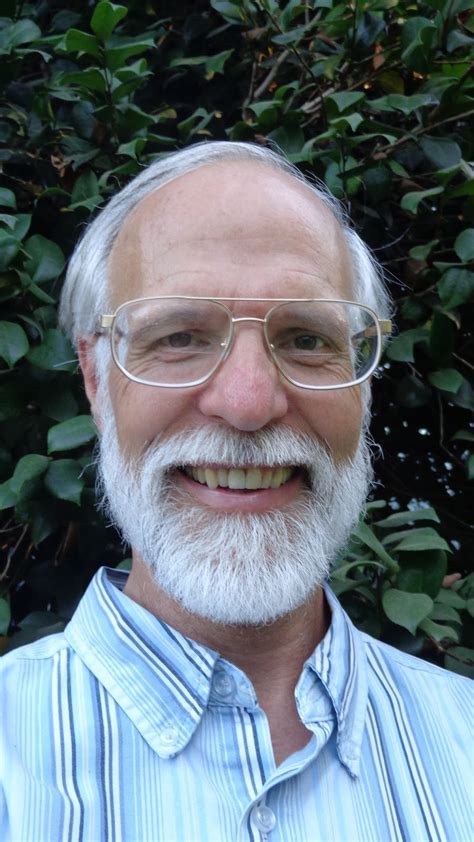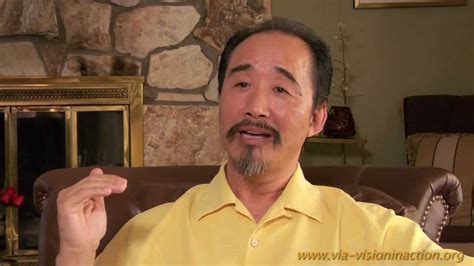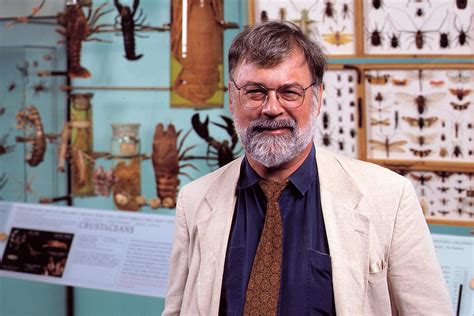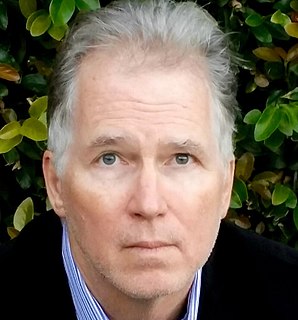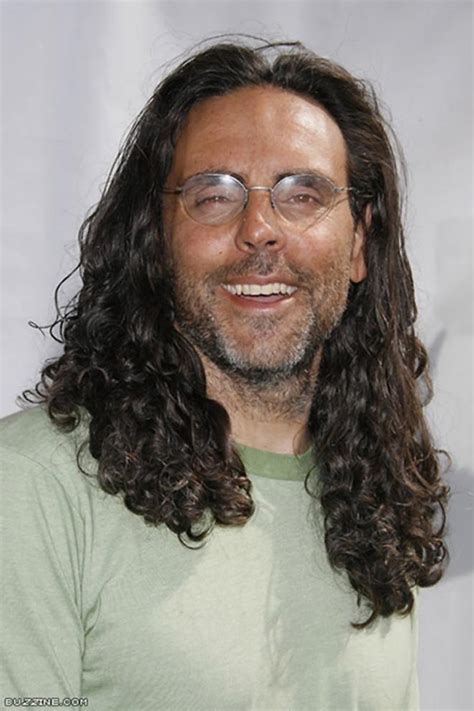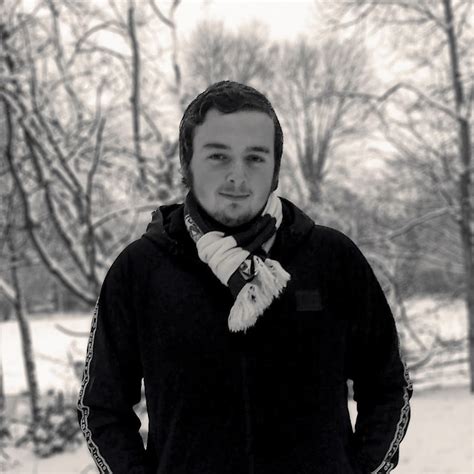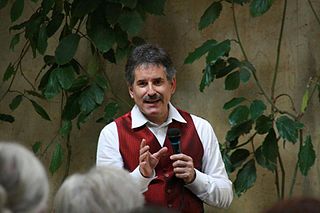Top 598 Evolutionary Quotes & Sayings - Page 10
Explore popular Evolutionary quotes.
Last updated on April 20, 2025.
Looking at the doctrine of Darwinism, which undergirded my atheism for so many years, it didn’t take me long to conclude that it was simply too far-fetched to be credible. I realized that if I were to embrace Darwinism and its underlying premise of naturalism, I would have to believe that: 1. Nothing produces everything 2. Non-life produces life 3. Randomness produces fine-tuning 4. Chaos produces information 5. Unconsciousness produces consciousness 6. Non-reason produces reason....The central pillars of evolutionary theory quickly rotted away when exposed to scrutiny.
I am willing to believe that my unobtainable sixty seconds within a sponge or a flatworm might not reveal any mental acuity that I would care to call consciousness. But I am also confident [...] that vultures and sloths, as close evolutionary relatives with the same basic set of organs, lie on our side of any meaningful (and necessarily fuzzy) border and that we are therefore not mistaken when we look them in the eye and see a glimmer of emotional and conceptual affinity.
A large number of well-trained scientists outside of evolutionary biology and paleontology have unfortunately gotten the idea that the fossil record is far more Darwinian than it is. This probably comes from the oversimplification inevitable in secondary sources: low-level textbooks semipopular articles, and so on. Also, there is probably some wishful thinking involved. In the years after Darwin, his advocates hoped to find predictable progressions. In general. these have not been found-yet the optimism has died hard and some pure fantasy has crept into textbooks.
The characteristic human trait is not awareness but conformity, and the characteristic result is religious warfare. Other animals fight for territory or food; but, uniquely in the animal kingdom, human beings fight for their 'beliefs.' The reason is that beliefs guide behavior, which has evolutionary importance among human beings. But at a time when our behavior may well lead us to extinction, I see no reason to assume we have any awareness at all. We are stubborn, self-destructive conformists. Any other view of our species is just a self-congratulatory delusion.
The positive evidence for Darwinism is confined to small-scale evolutionary changes like insects developing insecticide resistance....Evidence like that for insecticide resistance confirms the Darwinian selection mechanism for small-scale changes, but hardly warrants the grand extrapolation that Darwinists want. It is a huge leap going from insects developing insecticide resistance via the Darwinian mechanism of natural selection and random variation to the very emergence of insects in the first place by that same mechanism.
Even if this is the end of humankind, we dare not take away the chances some other life-form might have to succeed where we failed. If we retaliate, there will not be a dog, a deer, an ape, a bird or fish or lizard to carry the evolutionary torch. In the name of justice, if we must condemn and destroy ourselves, let us not condemn all life along with us! We are heavy enough with sins. If we must destroy, let us stop with destroying ourselves!
...the nervous systems of other animals were not artificially constructed - as a robot might be artificially constructed - to mimic the pain behavior of humans. A capacity to feel pain obviously enhances a species' prospects of survival...it is surely unreasonable to suppose that nervous systems that are virtually identical physiologically, have a common origin and a common evolutionary function, and result in similar forms of behavior in similar circumstances should actually operate in an entirely different manner on the level of subjective feelings.
Darwinism undermined traditional morality and the value of human life. Then, evolutionary progress became the new moral imperative. This aided the advance of eugenics, which was overtly founded on Darwinian principles. Some eugenicists began advocating euthanasia and infanticide for the disabled. On a parallel track, some prominent Darwinists argued that human racial competition and war is part of the Darwinian struggle for existence. Hitler imbibed these social Darwinist ideas, blended in virulent anti-Semitism, and--there you have it: Holocaust
Evolutionary biologists often appeal to parsimony when they seek to explain why organisms "match" with respect to a given trait. For example, why do almost all the organisms that are alive today on our planet use the same genetic code? If they share a common ancestor, the code could have evolved just once and then been inherited from the most recent common ancestor that present organisms share. On the other hand, if organisms in different species share no common ancestors, the code must have evolved repeatedly.
We are part of nature, a product of a long evolutionary journey. To some degree, we carry the ancient oceans in our blood. … Our brains and nervous systems did not suddenly spring into existence without long antecedents in natural history. That which we most prize as integral to our humanity - our extraordinary capacity to think on complex conceptual levels - can be traced back to the nerve network of primitive invertebrates, the ganglia of a mollusk, the spinal cord of a fish, the brain of an amphibian, and the cerebral cortex of a primate.
The exclusion of true esoteric religion has been the business of the State since ancient times. At first this was done via the establishment of the popular idealism of exoteric religious institutions in league with the State. But in modern times the same process is done by the strategic exclusion of conventional religious cultism, mystical idealism, and higher evolutionary Wisdom from the mechanisms of popular culture.
Business is a creative and therefore spiritual endeavor. Great entrepreneurs enter the field of business in the same way great artists enter the field of art. With their business creation, entrepreneurs express their spiritual desire for self-realization, evolutionary passion for self- fulfillment, and creative vision of a new world. The entrepreneur's business is their artwork. The creation of business is as creative as any creation in art. In fact, building a business may be the most creative human activity.
If I ask you who is the most famous scientist who ever lived, or the greatest scientist who ever lived you'll say either Einstein or Newton or something like that because their claims were supposed to apply universally. But the claim of somebody who is studying a particular feature of the evolutionary process like whether it's very fast or very slow, or occurs in steps and so on, that's not a universal claim, that's a rather specialised claim and so you can't claim to great fame and great success.
Science has only two things to contribute to religion: an analysis of the evolutionary, cultural, and psychological basis for believing things that aren't true, and a scientific disproof of some of faith's claims (e.g., Adam and Eve, the Great Flood). Religion has nothing to contribute to science, and science is best off staying as far away from faith as possible. The "constructive dialogue" between science and faith is, in reality, a destructive monologue, with science making all the good points, tearing down religion in the process.
I don't believe, for instance, that evolutionary biology or any scientific endeavor has much to say about love. I'm sure a lot can be learned about the importance of hormones and their effects on our feelings. But do the bleak implications of evolution have any impact on the love I feel for my family? Do they make me more likely to break the law of flaunt society's expectations of me? No. I simply does not follow that human relationships are meaningless just because we live in a godless universe subject to the natural laws of biology.
I think the Bhagavad Gita is about both the forces of light and the forces of darkness that exist within our own self, within our own soul; that our deepest nature is one of ambiguity. We have evolutionary forces there - forces of creativity, and love, and compassion, and understanding. But we also have darkness inside us - the diabolical forces of separation, fear and delusion. And in most of our lives, there is a battle going on within ourselves.
To journalists my move from comics to films to best-selling novels was resembling those little evolutionary maps too much, where you see the fish, and then it can walk, and then it's an ape and then it gets up on its hind legs and finally it is a man. I didn't like that. I didn't like the fact that there was something rather amphibious about me - at least in their heads - back when I was writing comics. So I like continuing to write comics, if only because it points out that I haven't just started to walk upright or left the water.
The first proponent of cortical memory networks on a major scale was neither a neuroscientist nor a computer scientist but .. a Viennes economist: Friedrich von Hayek (1899-1992). A man of exceptionally broad knowledge and profound insight into the operation of complex systems, Hayek applied such insight with remarkable success to economics (Nobel Prize, 1974), sociology, political science, jurisprudence, evolutionary theory, psychology, and brain science (Hayek, 1952).
There is little chance that aliens from two societies anywhere in the Galaxy will be culturally close enough to really 'get along.' This is something to ponder as you watch the famous cantina scene in Star Wars. ... Does this make sense, given the overwhelmingly likely situation that galactic civilizations differ in their level of evolutionary development by thousands or millions of years? Would you share drinks with a trilobite, an ourang-outang, or a saber-toothed tiger? Or would you just arrange to have a few specimens stuffed and carted off to the local museum?
Paleontologists ever since Darwin have been searching (largely in vain) for the sequences of insensibly graded series of fossils that would stand as examples of the sort of wholesale transformation of species that Darwin envisioned as the natural product of the evolutionary process. Few saw any reason to demur - though it is a startling fact that ...most species remain recognizably themselves, virtually unchanged throughout their occurrence in geological sediments of various ages.
Paleontologists had long been aware of a seeming contradiction between Darwin's postulate of gradualism, confirmed by the work of population genetics, and the actual findings of paleontology. Following phyletic lines through time seemed to reveal only minimal gradual changes but no clear evidence for any change of a species into a different genus or for the gradual origin of an evolutionary novelty. Anything truly novel always seemed to appear quite abruptly in the fossil record.
Evolutionary theory, properly understood, does not conflict with the idea that God occasionally intervenes in nature - for example, by once or twice causing a beneficial mutation to occur. Biologists have not detected any such interventions despite the data and theory they have assembled about mutation. However, I think it is a mistake to expect biological experiments to be able to detect such one-off acts of divine intervention, especially if those acts occurred in the distant past. Science isn't in that line of work.
The Great Story of our immense journey contains crucial lessons for guiding humanity safely through the dangers and confusions evident today. This grand epic will propel us forward in a spirit of expectant curiosity. We will place our trust not only in the Whole but also in our own species' capacity to serve as the vessel through which the evolutionary impulse is most active at this time.
It is so hard for an evolutionary biologist to write about extinction caused by human stupidity. Let me then float an unconventional plea, the inverse of the usual argument. The extinction of Partula is unfair to Partula. That is the conventional argument, and I do not challenge its primacy. But we need a humanistic ecology as well, both for the practical reason that people will always touch people more than snails do or can, and for the moral reason that humans are legitimately the measure of all ethical questions for these are our issues, not nature's.
Every civilized human being, whatever his conscious development, is still an archaic man at the deeper levels of his psyche. Just as the human body connects us with the mammals and displays numerous relics of earlier evolutionary stages going back to even the reptilian age, so the human psyche is likewise a product of evolution which, when followed up to its origins, show countless archaic traits.
The business of proving evolution has reached a stage when it is futile for biologists to work merely to discover more and more evidence of evolution. Those who choose to believe that God created every biological species separately in the state we observe them, but made them in a way calculated to lead us to the conclusion that they are the products of an evolutionary development are obviously not open to argument. All that can be said is that their belief is an implicit blasphemy, for it imputes to God an appalling deviousness.
I've noticed a lot of people talking about the wealth of roles for powerful women in television lately. And when I look around the room at the women here and I think about the performances that I've watched this year, what I see actually are women who are sometimes powerful and sometimes not. Sometimes sexy and sometimes not. Sometimes honourable and sometimes not. And what I think is new is the wealth of roles for actual women in television and in film. That's what I think is revolutionary and evolutionary and it's what turning me on.
Human enhancement is now being driven by military imperatives, at least in the US, because civilian society is more conservative in its approach. It’s a missed opportunity for a society-wide push to understand and reduce our need to power the brain down for hours every day. Every hour we sleep is an hour we are not working, finding mates, or teaching our children; if sleep does not have a vital adaptive function to pay for its staggering opportunity cost, it could be ‘the greatest mistake the evolutionary process ever made’.
What is happening, I think, it's really bigger than psychedelics, it's bigger than human evolution. We are not making the waves in this ocean. We are corks, riding the waves of the ocean. But we are privileged, by perhaps chance alone, to occupy a unique moment in the history of the universe. A moment when the universe goes through some kind of self-transforming, evolutionary, inflationary expansion. That's what's happening.
Within our own society, we jail more prisoners than any other country in the world, 85 percent of them people of nonwhite races — red, black, brown, and yellow. We are one of the few nations that still indulge in the death penalty for increasing numbers of these prisoners. We must become mindful of these negative things, since we need not support these actions of our nation to be affected negatively by their evolutionary impact, unless we mentally, verbally, and ultimately physically, disassociate ourselves from them.
The paradox of the human condition is expressed more in education than elsewhere in human culture, because learning to learn has been and continues to be Homo Sapiens' most formidable evolutionary task... It must also be clear that we will never quite learn how to learn, for since Homo Sapiens is self-changing, and since the more culture changes the faster it changes, man's methods and rate of learning will never quite keep pace with his need to learn.
We are part and parcel of a single and all-encompassing evolutionary current that is itself Spirit-in-action, the mode and manner of Spirit's creation, and thus is always going beyond what went before-that leaps, not crawls, to new plateaus of truth, only to leap again, dying and being reborn with each new quantum lurch, often stumbling and bruising its metaphyscical knees, yet always getting right back up and jumping yet again.
Today the human race is a single twig on the tree of life, a single species on a single planet. Our condition can thus only be described as extremely fragile, endangered by forces of nature currently beyond our control, our own mistakes, and other branches of the wildly blossoming tree itself. Looked at this way, we can then pose the question of the future of humanity on Earth, in the solar system, and in the galaxy from the standpoint of both evolutionary biology and human nature. The conclusion is straightforward: Our choice is to grow, branch, spread and develop, or stagnate and die.
We need merely understand that the evolutionary process is neither random nor determined but creative. It follows the general pattern of all creativity. While there is no way of fully understanding the origin moment of the universe we can appreciate the direction of evolution in its larger arc of development as moving from lesser to great complexity in structure and from lesser to greater modes of consciousness. We can also understand the governing principles of evolution in terms of its three movements toward differentiation, inner spontaneity, and comprehensive bonding.
When one becomes a liberal, he or she pretends to advocate tolerance, equality and peace, but hilariously, they’re doing so for purely selfish reasons. It’s the human equivalent of a puppy dog’s face: an evolutionary tool designed to enhance survival, reproductive value and status. In short, liberalism is based on one central desire: to look cool in front of others in order to get love. Preaching tolerance makes you look cooler, than saying something like, 'please lower my taxes.'
Whenever you're in a natural system and you're making sound, you are putting yourself at risk. As you go up the evolutionary ladder, from insects to frogs to birds and on up into mammals, the higher intelligence recognizes that when you vocalize, you put yourself at risk. So mammals generally vocalize or make noise much more rarely than, let's say, insects or frogs. And when they do, and put themselves at risk, it has to be worth the risk, and have true meaning, such as signaling during a hunting party, calling in prey, some religious or spiritual ceremony, something like that.
There was an op-ed piece in The New York Times by an evolutionary biologist or somebody - which was a curious place for the opinion to come from - and he said that there's no such thing as a completely free, uncensored medium, that people censor themselves all the time, in deference to hurting other people's feelings, or offending other groups, or in their own, not to provoke a fight. And you do self-censor certain things, and it's not necessarily a bad thing. That's just the way human social interaction works.
"Methodological naturalism" and "metaphysical naturalism" are terms that often surface in the continuing battle between evolutionary biology and creationism/intelligent design. The methodological thesis says that scientific theories shouldn't postulate supernatural entities; the metaphysical thesis says that no such entities exist. In this debate, God is the supernatural entity at issue; the question isn't whether science gets to talk about mathematical entities if Platonism is correct.
The great cognitive shift is an expansion of consciousness from the perspectival form contained in the lives of particular creatures to an objective, world-encompassing form that exists both individually and intersubjectively. It was originally a biological evolutionary process, and in our species it has become a collective cultural process as well. Each of our lives is a part of the lengthy process of the universe gradually waking up and becoming aware of itself.
Some people think that evolutionary psychology claims to have discovered that human nature is selfish and wicked. But they are flattering the researchers and anyone who would claim to have discovered the opposite. No one needs a scientist to measure whether humans are prone to knavery. The question has been answered in the history books, the newspapers, the ethnographic record, and the letters to Ann Landers. But people treat it like an open question, as if someday science might discover that it's all a bad dream and we will wake up to find that it is human nature to love one another.
My space chums think my unique hookup with humanity could be evolution's awkward attempt to jump-start itself up again. They're thinking just maybe, going crazy could be the evolutionary process trying to hurry up mind expansion. Maybe my mind didn't snap. Maybe it was just trying to stretch itself into a new shape. The cerebral cortex trying to grow a thumb of sorts.
Darwin seems to lose out with the public primarily when his supporters force him into a mano-a-mano Thunderdome death match against the Almighty. Most people seem willing to accept Darwinism as long as they don't have to believe in nothing but Darwinism. Thus, the strident tub-thumping for absolute atheism by evolutionary biologists like Richard Dawkins, whom the new issue of Discover Magazine rightly criticizes as "Darwin's Rottweiler," is self-defeating.
Our main source of psychic energy in the future will depend on our ability to understand this symbol of evolution in an acceptable context of interpretation. Only in the context of an emergent universe will the human project come to an integral understanding of itself. We must, however, come to experience the universe in its psychic as well as in its physical aspect. We need to experience the sequence of evolutionary transformations as moments of grace, and also as celebration moments in our new experience of the sacred.
In the complex course of its evolution, life exhibits a remarkable contrast to the tendency expressed in the Second Law to Thermodynamics. Where the Second Law expressed an irreversible progression toward increased entropy and disorder, life evolves continually higher levels of order. The still more remarkable fact is that this evolutionary drive to greater and greater order also is irreversible. Evolution does not go backward.
women's entry into the public sphere can be seen not merely as the result of contemporary economic pressures, the high rate of divorce, or the success of the feminist movement, but rather as a profound evolutionary response to a pervasive cultural crisis. Feminine principles are entering the public realm because we can no longer afford to restrict them to the private domestic sphere, nor allow a public culture obsessed with Warrior values to control human destiny if we are to survive.
I like to summarize what I regard as the pedestal-smashing messages of Darwin's revolution in the following statement, which might be chanted several times a day, like a Hare Krishna mantra, to encourage penetration into the soul: Humans are not the end result of predictable evolutionary progress, but rather a fortuitous cosmic afterthought, a tiny little twig on the enormously arborescent bush of life, which, if replanted from seed, would almost surely not grow this twig again, or perhaps any twig with any property that we would care to call consciousness.
We're a young species; We're only 175,000 years old. On the evolutionary scale, life on this planet is 4 billion years old. We're 175,000 years old. So we're trying something out. Who wouldn't think it would be better to have the most stuff to take as much as you could? As we do that, we see why the moral prophets come along and say, don't even store into barns, right? It's easier for a camel to pass through the eye of the needle than a rich man to enter the kingdom of heaven. We've seen we plunder nature. We plunder our neighbor. We create enemies because we're against each other.
One extremely important purpose of emotions from an evolutionary perspective is to help us decide what to remember and what to forget. The cavewoman who could remember which cave had the gentle guy who gave her food is more likely to be our foremother than the cave woman who confused it with the cave that held the killer bear. The emotion of love (or something resembling it) and the emotion of fear would help secure her memories.
In the final analysis the hierarchic pattern is nothing like the straightforward witness for organic evolution that is commonly assumed. There are facets of the hierarchy which do not flow naturally from any sort of random undirected evolutionary process. If the hierarchy suggests any model of nature it is typology and not evolution. How much easier it would be to argue the case for evolution if all nature's divisions were blurred and indistinct, if the systema naturalae was largely made up of overlapping classes indicative of sequence and continuity.
The show's writers had peppered the piece with words like "savage," "wild," and "animalistic." What bullshit. Show me the animal that kills for the thrill of watching something die. Why does the stereotype of the animalistic killer persist? Because humans like it. It neatly explains things for them, moving humans to the top of the evolutionary ladder and putting killers down among mythological man-beast monsters like werewolves. The truth is, if a werewolf behaved like this psychopath it wouldn't be because he was part animal, but because he was still too human. Only humans kill for sport.
There is a neuron in your brain that will respond only to pictures of Jennifer Aniston - provided you have had prior visual exposure to the actress. That neuron does not respond to pictures of Bill Clinton or Halle Berry. Only Jennifer. I used the story to explain the almost ridiculous plasticity of the organ. There is no such thing as Jennifer Aniston in our evolutionary history - she was born in 1969, for heaven's sake - but we are flexible enough to devote an entire cell to her if we have previously encountered her in some fashion.
The very comprehensibility of the world points to an intelligence behind the world. Indeed, science would be impossible if our intelligence were not adapted to the intelligibility of the world. The match between our intelligence and the intelligibility of the world is no accident. Nor can it properly be attributed to natural selection, which places a premium on survival and reproduction and has no stake in truth or conscious thought. Indeed, meat-puppet robots are just fine as the output of a Darwinian evolutionary process.
If I may bend your ear for a moment, I like Terry Pratchett. I like footnotes. I like footnotes even when they are not as entertaining as a Pratchett footnote, even when they are in the middle of a book on evolutionary biology and briefly explain the Red Queen hypothesis or the fate of the Stephen's Island Wren or how many bunnies can dance on the back of Australia. Footnotes fill me with a very mild glee. The endnote simply does not compare.
Conversation with animals could happen, but I think it would be easier for it to happen with creatures we share a bit more with - those that have been bred to interact with us, like dogs or horses, or ones to whom we have a natural evolutionary link, like chimps and other nonhuman apes. I mean, we do communicate with dolphins and whales, but we're not trying to get to the depths of their understandings. I feel that with animals as different from us as the whales and dolphins, it's likely to work better with us just watching them and trying to figure them out.
Humanity is looking for a new story. The one it has embraced since the Renaissance is no longer viable. Despite all of its positive contributions to modern life, three hundred years of scientific-technological development has left our civilization in an untenable position-at odds with its natural environment and ultimately its own deeper, collective, soul. Only a global shift in fundamental perceptions, values, and corresponding actions will allow human-kind to resume an evolutionary pat in alignment with nature and the larger cosmos.
When you awaken to what I call the Authentic Self, which is the spiritual or evolutionary impulse, what begins to emerge is the dawning recognition of the fact that each one of us, at our highest level, is that Authentic Self, which is actually the same energy and intelligence that originally inspired the entire creative process. You begin to intuit and feel directly connected to the very impulse that initiated the whole event fourteen billion years ago and is driving it right now.
It must be stressed that there is nothing insulting about looking at people as animals. We are animals, after all. Homo sapiens is a species of primate, a biological phenomenon dominated by biological rules, like any other species. Human nature is no more than one particular kind of animal nature. Agreed, the human species is an extraordinary animal; but all other species are also extraordinary animals, each in their own way, and the scientific man-watcher can bring many fresh insights to the study of human affairs if he can retain this basic attitude of evolutionary humility.







